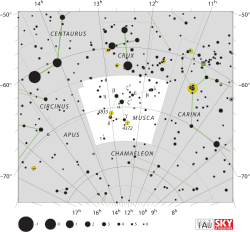Gamma Muscae

| |
| Observation data Epoch J2000.0 Equinox J2000.0 | |
|---|---|
| Constellation | Musca |
| Right ascension | 12h 32m 28.01343s[1] |
| Declination | −72° 07′ 58.7597″[1] |
| Apparent magnitude (V) | 3.84 |
| Characteristics | |
| Spectral type | B5V |
| B−V color index | −0.157 |
| Astrometry | |
| Radial velocity (Rv) | 2.5 km/s |
| Proper motion (μ) | RA: −51.34[1] mas/yr Dec.: −5.40[1] mas/yr |
| Parallax (π) | 10.04 ± 0.13[1] mas |
| Distance | 325 ± 4 ly (100 ± 1 pc) |
| Absolute magnitude (MV) | –1.1[2] |
| Details | |
| Luminosity | 790[2] L☉ |
| Surface gravity (log g) | 4.04[2] cgs |
| Temperature | 16,000[2] K |
| Other designations | |
| Database references | |
| SIMBAD | data |
Gamma Muscae is a star in the southern circumpolar constellation of Musca, or the Fly. It is a blue-white star of spectral type B5V that ranges between magnitudes 3.84 and 3.86 over a period of 2.7 days. It is a variable of a different type, classed as a Slowly pulsating B star.[3] It is around five times as massive as the Sun.[4]
This star is a proper motion member of the Lower-Centaurus Crux sub-group in the Scorpius-Centaurus OB association, the nearest such association of co-moving massive stars to the Sun.[2]
References
- 1 2 3 4 5 van Leeuwen, F. (November 2007), "Validation of the new Hipparcos reduction", Astronomy and Astrophysics, 474 (2): 653–664, arXiv:0708.1752
 , Bibcode:2007A&A...474..653V, doi:10.1051/0004-6361:20078357
, Bibcode:2007A&A...474..653V, doi:10.1051/0004-6361:20078357 - 1 2 3 4 5 de Geus, E. J.; de Zeeuw, P. T.; Lub, J. (June 1989), "Physical parameters of stars in the Scorpio-Centaurus OB association", Astronomy and Astrophysics, 216 (1-2): 44–61, Bibcode:1989A&A...216...44D
- ↑ BSJ (5 March 2012). "Gamma Muscae". AAVSO Website. American Association of Variable Star Observers. Retrieved 21 December 2013.
- ↑ Molenda-Zakowicz, J.; Połubek, G. (2004). "Empirical absolute magnitudes, luminosities and effective temperatures of SPB variables and the problem of variability classification of monoperiodic stars" (PDF). Acta Astronomica. 54: 281–97 [283]. Bibcode:2004AcA....54..281M.
This article is issued from Wikipedia - version of the 8/5/2016. The text is available under the Creative Commons Attribution/Share Alike but additional terms may apply for the media files.